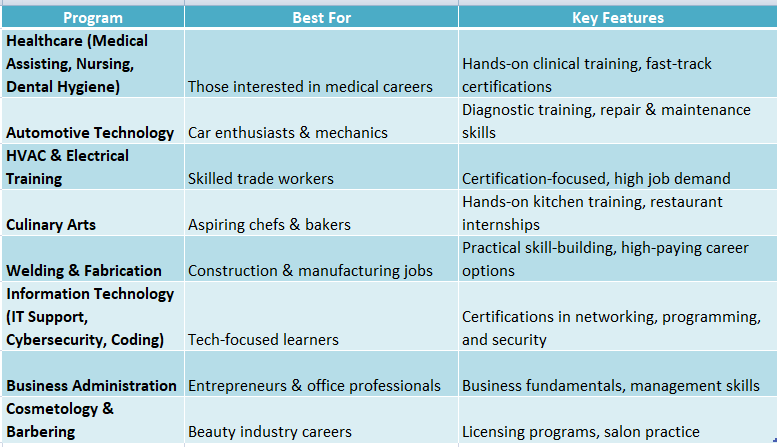
Understanding What Are Vocational Colleges: How They Work
Understanding what vocational colleges are is important for anyone considering their future education. These schools focus on teaching specific skills for particular careers, making them a great option for students who want to jump straight into the workforce. So, what are vocational colleges?
What Are Vocational Colleges?
Vocational colleges, also known as trade schools, offer vocational training programs that prepare students for various careers. These programs can range from healthcare to automotive repair, providing hands-on experience and practical knowledge. Unlike traditional colleges, vocational schools emphasize skill development over academic theory.
Benefits of Vocational Training Programs
- Quick Entry into the Workforce: Many programs can be completed in a year or two.
- Focused Learning: Students learn exactly what they need for their chosen careers.
- Job Placement Assistance: Many vocational schools help students find jobs after graduation.
If you’re searching for vocational schools near me, you’ll find plenty of options that cater to your interests and career goals.
Unlock your potential with online degrees—Learn more!
The Benefits of Attending a Vocational College
Vocational colleges are special schools that focus on teaching students specific skills for jobs. Understanding What Are Vocational Colleges and how they work is important because they offer a direct path to employment. Instead of spending years in traditional college, students can learn practical skills in a shorter time, making them job-ready faster.
Benefits of Attending a Vocational College
- Hands-On Learning: Students get to practice real-world skills in their chosen field.
- Shorter Programs: Many vocational training programs can be completed in one to two years, saving time and money.
- Job Placement Assistance: Many vocational schools near me offer support in finding jobs after graduation, which is a huge plus!
In addition to these benefits, vocational colleges often have smaller class sizes. This means students can get more personalized attention from instructors. Plus, the focus on specific careers helps students feel more confident and prepared for the workforce. So, if you’re considering your options, think about how vocational training programs can lead you to a successful career!
How Do Vocational Colleges Differ from Traditional Colleges?
Vocational colleges are a great option for students who want to jump straight into a career. But how do they differ from traditional colleges? Understanding this can help you decide if vocational training programs are right for you. Let’s explore the key differences!
Focus on Practical Skills
Unlike traditional colleges that often emphasize academic learning, vocational schools focus on hands-on training. Students learn specific skills for jobs like plumbing, nursing, or graphic design. This means less time in classrooms and more time in workshops or labs, preparing for real-world work.
Shorter Programs
Vocational colleges typically offer shorter programs compared to traditional degrees. Many vocational training programs can be completed in a year or two, allowing students to enter the workforce faster. If you’re searching for “vocational schools near me,” you’ll find options that fit your timeline and career goals.
What Are Vocational Colleges Offering in Today’s Job Market?
Vocational colleges play a crucial role in today’s job market by providing specialized training that equips students for specific careers. These institutions, often referred to as trade schools, emphasize practical skills and hands-on experience, making them ideal for individuals eager to enter the workforce quickly.
What Are Vocational Colleges?
Vocational colleges offer vocational training programs that teach essential skills for various professions, ranging from healthcare to technology. Many students opt for vocational schools near me to secure local job opportunities upon graduation.
Benefits of Vocational Training Programs
- Hands-On Learning: Students gain real-world experience through practical training.
- Shorter Duration: Programs typically last one to two years, facilitating a swift entry into the job market.
- Job Placement Assistance: Many vocational colleges provide support in securing employment after graduation, easing the transition.
In summary, vocational colleges are an excellent choice for those looking to start their careers without the extended commitment of traditional college.
Exploring Popular Programs at Vocational Colleges

Vocational colleges play a crucial role for students eager to enter the workforce with practical skills. Knowing what are vocational colleges and how they function can guide your educational choices. These institutions specialize in training for specific careers, making them a popular option.
Exploring Popular Programs at Vocational Colleges
Vocational training programs span various fields, including:
- Healthcare: Nursing and dental assisting.
- Trade Skills: Plumbing, electrical work, and carpentry.
- Culinary Arts: Cooking and baking.
- Information Technology: Computer repair and networking.
These programs emphasize hands-on training, which benefits students who learn best through practice. Locating vocational schools near me is easy with a quick online search. Many colleges provide flexible schedules, allowing students to manage work and study effectively. With the right vocational training programs, you can acquire in-demand skills, paving the way for exciting job opportunities.
Who Should Consider Enrolling in a Vocational College?
Vocational colleges are a fantastic option for those looking to jumpstart their careers quickly. But who should consider enrolling in a vocational college? Understanding what vocational colleges are and how they work can help you make an informed decision about your future. Let’s dive in!
Who Should Consider Vocational Colleges?
If you’re someone who enjoys hands-on learning and wants to enter the workforce sooner rather than later, vocational training programs might be perfect for you. Here are a few groups of people who could benefit:
- High School Graduates: If you’re fresh out of high school and eager to start working, vocational schools near you can offer specialized training in various fields.
- Career Changers: If you’re looking to switch careers, vocational colleges provide the skills needed for a new job without the lengthy commitment of a traditional degree.
- Those Seeking Specific Skills: If you have a clear idea of what you want to do, vocational training programs can help you gain the specific skills employers are looking for.
How Do Vocational Colleges Prepare Students for Careers?
Vocational colleges play a crucial role in shaping the future of students by providing practical skills and training for specific careers. Understanding what are vocational colleges and how they work is essential for anyone looking to jumpstart their career. These institutions focus on hands-on learning, preparing students for the workforce in various fields.
Vocational colleges offer a variety of vocational training programs tailored to meet industry demands. Here’s how they help students:
- Hands-On Experience: Students engage in real-world projects, making learning relevant and exciting.
- Industry Connections: Many vocational schools have partnerships with local businesses, providing students with internship opportunities.
- Focused Curriculum: Programs are designed to teach specific skills, ensuring students are job-ready upon graduation.
If you’re searching for vocational schools near me, you’ll find that these colleges not only equip students with knowledge but also instill confidence, making them valuable assets in the job market.
Unlock your potential with online degrees—Learn more!
The Role of Hands-On Training in Vocational Education
Vocational colleges play a crucial role in shaping careers by providing specialized training. But what are vocational colleges, and how do they work? These institutions focus on practical skills, preparing students for specific jobs. This hands-on approach is essential for those looking to enter the workforce quickly and effectively.
When you think about vocational training programs, imagine learning by doing. Unlike traditional schools, vocational schools emphasize real-world experience. Here’s why that matters:
- Skill Development: Students gain practical skills that employers value.
- Industry Connections: Many programs partner with local businesses, offering internships and job placements.
- Focused Learning: Courses are tailored to specific careers, making learning relevant and engaging. In summary, vocational colleges provide a unique educational experience.
By focusing on hands-on training, they equip students with the skills needed for success. So, if you’re searching for vocational schools near me, consider how these programs can jumpstart your career journey!
What Are Vocational Colleges: Myths vs. Reality
Vocational colleges provide practical education designed to prepare students for specific careers. Unlike traditional colleges, they emphasize hands-on training and skills development, making them ideal for those eager to enter the workforce quickly.
Myths About Vocational Colleges
There are several misconceptions about vocational schools:
- Only for Low Achievers: This is untrue! Vocational training programs attract diverse students aiming for specific careers.
- Limited Career Options: In fact, vocational colleges offer a variety of programs, from healthcare to technology, providing numerous choices for students.
The Reality of Vocational Training Programs
Vocational schools near me offer specialized training that typically lasts one to two years. Students engage in both classroom learning and practical experience, ensuring they are job-ready upon graduation. Additionally, many programs feature internships or job placement assistance, facilitating a smoother transition into the workforce.
How CollegeDegree.School Can Help You Choose the Right Vocational College
Choosing the right path for your future can be overwhelming, especially when considering education options. Understanding What Are Vocational Colleges and how they operate is essential. These institutions focus on practical skills and training, preparing students for specific careers. This makes them a great choice for those eager to jump into the workforce quickly.
At CollegeDegree.School, we simplify your search for Vocational Schools Near Me. Our resources guide you through various Vocational Training Programs, helping you find the best fit for your interests and career goals. You can explore programs that align with your passions, whether it’s culinary arts, automotive technology, or healthcare.
Benefits of Vocational Colleges
- Hands-On Learning: Students gain practical experience in their chosen field.
- Shorter Programs: Many vocational programs can be completed in less time than traditional degrees.
- Job Readiness: Graduates often find jobs quickly due to their specialized training. With our help, you can confidently choose a vocational college that sets you on the path to success!
Unlock your potential with online degrees—Learn more!
FAQs
-
What is a vocational college?
A vocational college is an educational institution that provides specialized training for specific careers, focusing on hands-on skills and job readiness. -
How is a vocational college different from a traditional college or university?
Unlike traditional colleges that offer academic degrees, vocational colleges focus on practical training for specific careers, often requiring less time to complete. -
What types of programs are offered at vocational colleges?
Programs include healthcare, automotive technology, cosmetology, culinary arts, welding, information technology, and other skilled trades. -
Are vocational colleges accredited?
Many vocational colleges are accredited by national or regional accrediting bodies, ensuring quality education and industry recognition.
-
Who can attend a vocational college?
Vocational colleges are open to high school graduates, GED holders, and sometimes even individuals without a diploma, depending on the program. -
Do vocational colleges require entrance exams?
Some programs may require placement tests, but many vocational schools have open enrollment policies.






